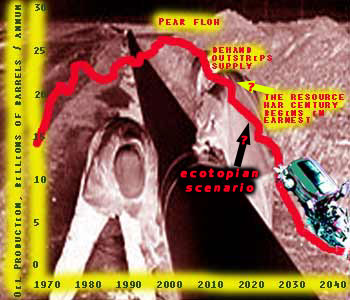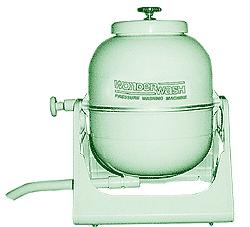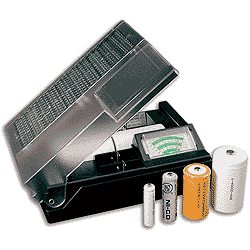|
from 28 august 2005 blue vol IV, #20 |
|

by Norris Thomlinson
 TRANSPORTATION
TRANSPORTATION
This was easy for me, since I rarely need to go anywhere and already bike when I do venture out. (See exception under "Cheats" section.) WASHING DISHES/BATHING/LAUNDRY The house in which I live has the fascinating feature of a garden hose fully exposed to sun on the exterior south wall of the house, providing an easy way to kill any plants you dislike. The setup has the added benefit of providing water too hot for immersion of your hand. This became my source of hot water for bathing, laundry, and for washing dishes/canning jars/storage buckets/etc. I took sponge baths which used about 1.5 gallons of hot water per bath (and I could probably further reduce that usage). In the words of my housemate, I "don't stink too much!" which I guess means the baths were a success. I did laundry with the Wonder Wash pressure washer [2 footnote], a device I've had since last fall. You add hot water, detergent, and clothes, then screw the top down to create an airtight seal and manually rotate the laundry drum for about 2 minutes. The high pressure environment inside forces the water and detergent through the clothes. Water and detergent usage is minimal, and the clothes smell clean to me. It doesn't do well at removing stains; perhaps by applying special stain removal stuff I could take care of that too, but I've never cared about stains in my clothes so I haven't bothered to experiment with that. Clothes of course were dried on a drying rack, outside. LIGHTING
I tried unsuccessfully to get on a sleeping schedule of 10 PM - 7 AM, to make near maximum use of daylight hours while accomodating Portland Peak Oil meetings and other occasional night activities. I had a very hard time falling asleep each night, mostly due (I think) to environmental factors of an overheated bedroom with no shades on the west facing window and the window facing directly into a noisy neighborhood. Yesterday evening I finally wedged a towel across the window which did wonders for blocking the evening sun and allowing me to close the window at bedtime to block out the noise. This should make it a lot easier to fall into a sensible sleep schedule minimizing the need to turn on lights. OTHER ELECTRICITY This barely warrants mention, but the wireless phone used by our household requires electricity, so with the blessing of Pete (Leah was out of town) I added an older non-electric phone. I don't watch any TV and only the occasional movie, so it wasn't difficult to do without those. I do frequently listen to recorded music, and at times wished I could turn on the stereo while working on other things...but not so much that I ever got around to finding my portable CD player and solar charging a couple more batteries. Going without computer use (mostly - see "Cheats" section below) was somewhat difficult, though also hugely relieving in some ways. I lose a *lot* of time to email and reading up on news which is really irrelevant since I already know that I need to spend my time learning as many useful skills as I can and getting as much sustainable infrastructure into place as I can. There were a few projects on which I was working where internet access would have been helpful, and I mostly just made sure I researched what I needed before I began the fossil fuel fast, or postponed the projects rather than waste time muddling through them without the info I felt I needed. It helps that suddenly it looks like I'll be moving to a new place in a month or so, making the planting of seeds at my current location mostly pointless and eliminating the need for me to research details of every seed I had intended to plant. COOKING/FOOD This was absolutely the hardest aspect of the experiment for me, dependent as I am (and presumably as most of us are) on refrigeration and the ability to cook food at will with an electric or gas stove. Most of my diet is based on dumpster-dived [4 footnote] food which generally needs to be refrigerated to remain fresh for more than a couple of days, and I do not have a cool root cellar. I tried to manage temperatures by moving a few foods back and forth between the basement and the house as temperatures fluctuated through the day, but it was still too warm for optimum food storage. I learned how to sprout seeds for raw consumption, doing a few batches of adzuki beans and one batch of wheat. These made good snacks on their own or additionns to salads, sandwiches, and meals of rice & beans. I ate a lot of stale dumpster-dived bread (which works much better when rejuvinated with a little toasting) with Earth Balance (butter substitute which holds up reasonably well without refrdgeration) and jars of preserves, fruit butters, and jams which I could eat through within 2-3 days. Some sandwiches consisted of Earth Balance, arugula, tomatoes, and whatever sprouts or solar cooked beans were on hand.
Since our community garden had no success in growing proper lettuce, I ate two weed salads comprised mostly of volunteer amaranths and dwarf mallow. Dumpster-dived tomatoes and/or sprouts and a good dosage of salad dressing helped make the salads palatable, but obviously not so desirable as to wean me away from dependence on stale bread and into healthier daily salads as I had originally envisioned. :/ DIFFICULTIES/CHEATS Three times I went online to deal with email/internet tasks requiring immediate attention, and each time was easily distracted by other emails, checking news, etc. It's a big challenge for me when online to focus on specific tasks and not waste time on other non-critical clicks. There's too much valuable info online for me to seriouly consider cutting myself off completely, but I need to find ways to keep myself focused and efficient so I can do the necessary research but then get back to the most important piece: action on the ground. I did use a car once, to pick up a special order of beans from the food coop half a mile away. That could have been avoided with multiple trips on Theressa's bike, which is outfitted with a basket, or with a bike trailer, which I have not yet researched. For now I decided to just do the time-efficient thing and drive, knowing that a bike upgrade & bike trailer is high on the list of to-do projects. I went out to eat several times and participated in two potlucks, all undermining the food portion of the experiment. (For one of the potlucks I brought a dish with beans cooked in the solar funnel, but corn steamed via propane and some ingredients which had been refrigerated.) I ate out so often not because I was actively avoiding figuring out something at home, but rather because of several invitations to go out. No matter the intention, it had a very real impact on my food situation and my diet would have been even harder without those "cheats." And of course there's the general issue of dependence on infrastructure based on cheap fossil fuels...the aluminum foil I bought at the store to make the solar funnel, the duct tape and super glue I bought to patch up my clothes drying rack, the black spray paint for the glass jars and pots used with the solar funnel, and the many items I already own but which have finite lifespans and may or may not be easily replaceable in the future. Lots to think about and plan for there... SUMMARY This was an excellent experiment for me, and a great incentive to finally implement some of the projects I've had on my list, especially the solar funnel, learning to sprout seeds for consumption, learning to sponge bathe, and experimenting more with the laundry pressure washer (shelved since last fall, when I discovered it wasn't much fun to hand-wring water from clothes in 50 degree weather). I did not do as well as I'd hoped in finding ways to eat enjoyable raw foods, as so far I'm not crazy about sprouts, and the salads I made weren't great. The solar cooking thing is wonderful, but has limited applicability most of the year in our cloudy Pacific Northwest climate. In general, food production, storage, and preparation, which are the most important pieces of sustainability, promise to be the hardest aspects for me to disentangle from dependency on modern appliances and fossil fuels. The rest of my life has already been largely pared down to the basics, but it turns out that, no matter what, I still need to eat! I intend to integrate many of the practices of the last 10 days into my regular life now, and to focus on the challenges (especially around food) and keep working on ways to reduce energy usage and dependency without feeling like I'm sacrificing my standard of living (or losing weight!) Perhaps by this time next year I'll be living fossil-fuel-free routinely in the summer, and ready to embark on the even larger challenge of going without fossil fuels through the winter! - Norris in Oregon
|
|||
|
BLUE is looking for short fiction, extracts of novels, poetry, lyrics,
polemics, opinions, eyewitness accounts, news, features, information and arts
in any form relating to eco cultural- social- spiritual issues, events and
activites (creative and political). Send to Newsdesk. |

 I carried my bike front headlight in my pocket wherever I went, to use
during the daytime in dark basements/garages, and to use at night as needed. The
light's batteries were charged using a solar battery charger [
I carried my bike front headlight in my pocket wherever I went, to use
during the daytime in dark basements/garages, and to use at night as needed. The
light's batteries were charged using a solar battery charger [ I built a parabolic solar reflector oven [
I built a parabolic solar reflector oven [